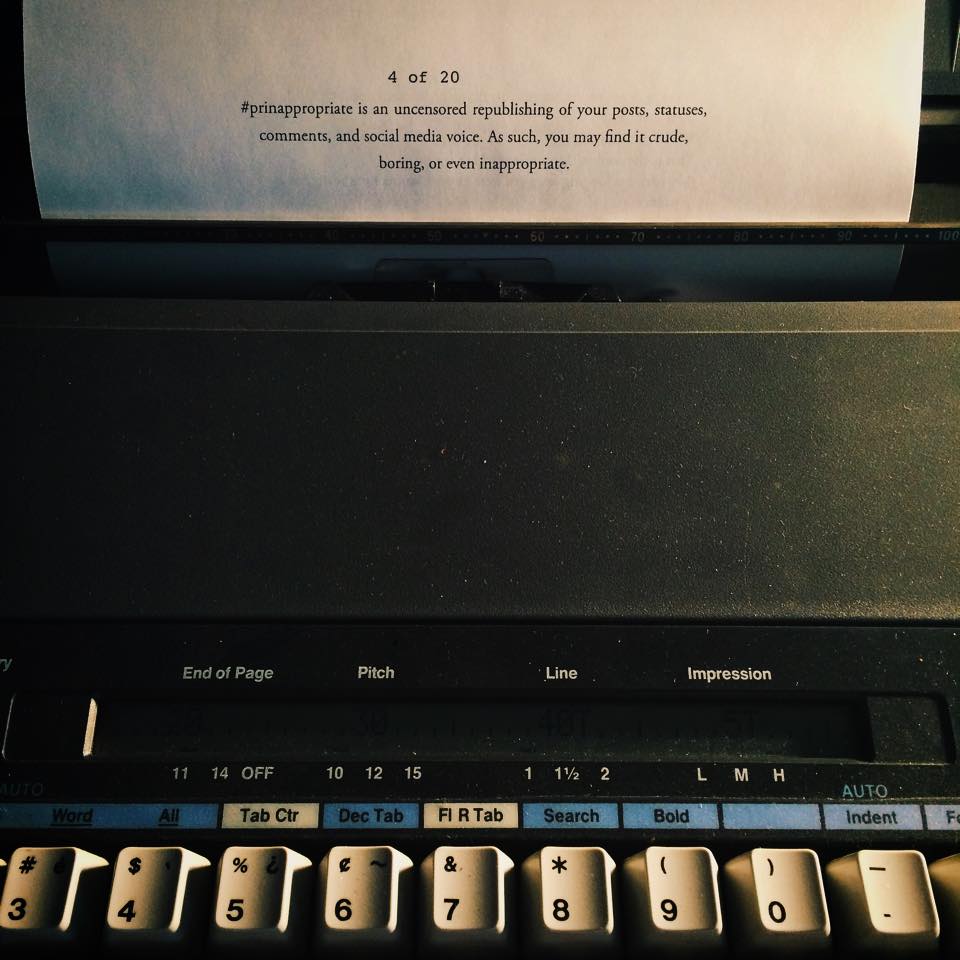In the week leading to the Public Affairs Conference, the campus was filled with confusion when students found pamphlets in their mailboxes. The pamphlets, titled “#prinappropriate” contained a collection of social media posts arranged in the style of a poem. The confusion was largely caused by the anonymity, as no one came forward to claim authorship. Most of the posts, especially those that came from Facebook, however, could be recognized, because they had been collected from public pages on the site.
There was a general conversation among students regarding #prinappropriate, but the main concern at hand was to try and figure out who was behind the pamphlet, and why it was in people’s mailboxes.The conversation took a complete turn when Austin Moyle -currently taking a semester off- posted on the facebook page ‘The Maple Tree,’ “I’ve only been on campus a few times this semester, but to whomever put together #prinappropriate: thank you for the best thing I’ve ever gotten in my mailbox. I’m not kidding.”
His post may have seemed like a simple expression of gratitude, but the responses it sparked on the comment section demonstrated the magnitude of larger concerns regarding what students are talking or not talking about. It is also during this discussion that the creators of #prinappropriate were revealed.
#prinappropriate is a project in the “New Media and Social Practice” class, taught by a visiting professor, Eric Gray. Hanne Anderson, a student in the class, and of the creators of #prinappropriate said that the class has been looking ways that art can be inclusive and participatory to the audience.
Anderson said that #prinappropriate was meant to be a mirror to the Principia community. “We wanted to shed light on our culture of communication at this school. What are we spending our time talking about on public forums, like, I wanna sell my clothes or I wanna do this… and then what we are talking about on the side, on places such as Yik Yak.”
One of the main issues raised in the Facebook thread was whether students live in “Prin Bubble” This phrase is often used to refer to the notion that students care only about what affects them, and disregard what issues outside their world. Alaina Carlson highly criticized this idea, “just because we stand alone as a college for Christian Scientists doesn’t mean we’re being ignorant to what’s going on in the outside world, and personally I don’t think that Prin’s system of guidance leads me into false understanding or a misguided way of looking at what’s going on around me.”
Angela Lupher, another commenter added, “…pretending that the “Prin Bubble” phenomenon is associated exclusively with or even primarily with Prin is both self centered and counterproductive. Pretty much every person on the planet finds things close to their experience more important than larger issues. I care more about the paper I have tomorrow than the fact that there are kids in the world who aren’t getting the education they deserve.”
While some were offended by the Prin Bubble issues, others were concerned about their the manner in which the pamphlets were distributed. Andrew Lambert-Cole said that putting the pamphlets in people’s mailboxes was “an invasion of privacy.” Asked why they chose to use this methodology, Gabe Hudson, said that they knew that people would not be happy, but they chose it because they concerned that students would not read publicly distributed pamphlets.
Other students saw #prinappropriate as an opportunity to talk about issues that people avoid in public forums, but discuss anonymously on places like Yik Yak. “I will say that as a community we do fail to talk about the inappropriate things. I can almost guarantee that had this been a group discussion of some sort only a handful of people would of showed up if anyone! I appreciated seeing my status in there because as a black women on this campus (yes! Im bringing in race, because contrary to popular belief it is a problem!) my thoughts were represented. So many people deal with verbal abuse, derogatory comments, and other things that we as a community DO NOT TALK ABOUT, and that is a choice we make.” Shirley Moihloe commented.
Much of the backlash against #prinappropriate was the pamphlets were not the best way to start a conversation about issues. Hudson said their their intention was not to start a conversation, but provide a mirror for the Prin community to look at itself. “#prinappropriate has succeeded in providing a structure for suitable discussions…Has there been such a strong and educated and informed response about subjects prevalent to Prin like there was on that Facebook post? The post brought about a lot of issues regarding Prin bubble, race, and gender.”




